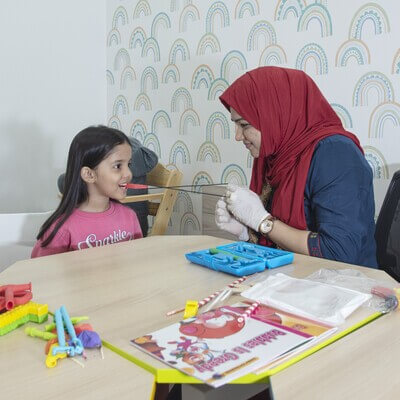Home / Picky Eating / Feeding Therapy
Feeding Therapy for Children
Is your child a picky eater? Feeding therapy can help. Our feeding therapists work closely with children and parents to make eating easier and more enjoyable.
What is Feeding Therapy?
Feeding therapy goes beyond just teaching a child how to eat. This therapy aims to make eating an enjoyable time for the child and their family. It can make eating both physically easier for the child and mentally less stressful. A trained therapist targets the child’s difficulty with eating, whether it be extreme pickiness when it comes to foods, or physical limitations, like difficulty chewing and swallowing.
Feeding therapists work closely with patients and their families to determine the source of the child’s difficulties and develop very specific therapies to make the entire process of eating easier and more enjoyable.
Kids can be picky eaters, but some children struggle with eating more than others. While a number of children grow out of a picky eating phase, others may need some help to try new foods. Feeding therapy can be a great option for a child who isn’t eating or swallowing correctly. Feeding therapy goals include increasing the range of accepted foods, decreasing the child’s sensitivity to certain textures, and improving the child’s mouth coordination & movement.
We ensure children reach their full potential!





Frequently Asked Questions
What is Feeding Therapy?
Feeding therapy helps children with feeding difficulties develop their oral motor skills, expand their food repertoire, and improve their mealtime behaviors.
Why might my child need Feeding Therapy?
Children might need feeding therapy for various reasons, including picky eating, food aversions, oral motor challenges, and difficulty with different food textures.
What does a Feeding Therapy assessment involve?
A feeding therapy assessment may involve observing your child’s eating habits, assessing their oral motor skills, evaluating their sensory responses to food, and discussing your concerns and your child’s history.
What types of activities are involved in Feeding Therapy sessions?
Feeding therapy activities can include sensory exploration of foods, oral motor exercises, and gradual introduction of new foods. Activities are tailored to each child’s specific needs and goals.
How often will my child need Feeding Therapy?
The frequency of feeding therapy sessions will depend on your child’s individual needs and goals.
How can I support my child's Feeding Therapy goals at home?
Therapists may provide strategies and activities that you can practice with your child during mealtimes.
My child is a very picky eater, what can feeding therapy do?
Feeding therapy can address sensory issues related to food and help expand food preferences.
What is Avoidant and Restrictive Food Intake Disorder (ARFID)?
It is an eating disorder where people limit the amount or type of food they eat.
What are Oral Motor skills?
These are the movements of the mouth, lips, tongue, and jaw which are important for eating and speaking.
What is tongue thrust?
It is when the tongue pushes forward during swallowing or speaking.
How will I know how my child is progressing?
Therapists provide assessment reports, progress notes, and school reports to document your child’s progress.
What is an SLT/Feeding Therapy Progress Note?
It documents a child’s progress in therapy over a period of time, including improvements in specific skills and ongoing goals.
What is an SLT/Feeding Therapy Assessment Report?
It summarizes the findings of an initial evaluation and outlines recommendations for therapy.
See what our clients says!
Indrani M.
The warm, playful and attractive environs of Power Learning is gradually turning out to be an invaluable part of Kia's support system. Snehal (her OTist) is an energetic, knowledgeable and highly personable individual, who works very closely with me to model a streamlined and comprehensive sensory approach for my child. Kia loves her!
Meghna (her Speech and Language therapist) is talented and superbly dynamic in her methodology. She is professional and confident in her field, very warm and loving with my daughter and uses fun and innovative approaches to address Kia's functional language requirements.
BIG love and thanks to Anisha and Dev, for having such a lovely niche in Bombay for our special little angels.
Jaanya B.
Ishana comes home everyday telling me stories about how fun it is to be at Power Learning.
Ms Parul & Ms Swati
I'm very much aware of the effort you put into each child. Thank you for going above and beyond for Ishana and being such a caring Teacher to her.
Ms Arpita & Ms Minali
Your play based learning approach is Amazing! Thank you for instilling love of learning into my child. It has a pleasure watching her enjoying every bit of her class.
Ms Maitri
Teachers require so many positive qualities like Care, Compassion, Patience and Commitment. You have all the qualities in Abundance. Thank you for all you do!
Ms Anisha
It's great to see how visible and accessible you are around Power Learning! You are always available for discussions with us at all times. Coming to Mumbai from Indonesia was not easy until I found Power learning Center, Truly appreciate your Guidance and Love.. keep up the good work and I hope to see a marked improvement in my child very soonThank you! Thank you! Thank you!!🙏♥️
Yogita M.
For me, Power Learning is a One Stop Solution! Equipped with state of art facilities and excellent therapists this centre has it all under one roof.
Snehal ( OTist) and Meghna ( Language therapist ) have both used tailor made strategies to work on my daughter’s needs. Moreover , both ensure that i am kept informed on the road map for my child and also follow a similar approach at home.
Although, this is just the beginning and consistency is the key , I can certainly say that 3 weeks of intensive therapy has shown noteworthy positive changes in my daughter such as increased focus / attention span , improvement in expressive language and social skills.
Big Thank You to the dynamic team of specialists at Power Learning . Special thanks to Parul , Anisha & Dev.
- Juhu
3rd Floor, Film Industry Welfare Trust Building, Next to Ajivasan Hall, Juhu Tara Road, Mumbai – 49.
- Goregaon
APML Towers, 5th Floor, 53/1 Vishweshwar Nagar Road, Opp. Pravasi Industrial Estate, Goregaon (East), Mumbai- 63.
- +91 90040 53414
- +91 85915 72877
- anisha@powerlearning.app
- parulm@powerlearning.app
